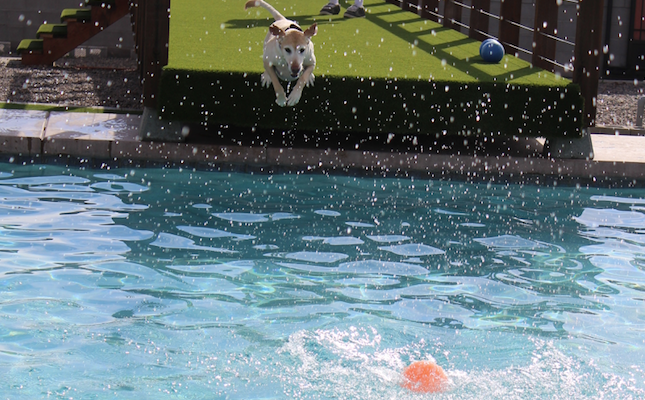Summer has arrived in sunny Arizona and along with that comes our often record breaking heat. Only a few minutes in such high temperatures can affect pets and risk their lives.
For guests at The Furshire, we schedule pool splash time in the mornings during summer to avoid the hottest part of the day. This allows the dogs to get some splash time in while temperatures are still safe outdoors.
Here are a few additional tips on keeping your pets safe during summer heat:
Remember that the pavement can be hot when air temperature still feels ok. Always check the pavement with your hand. If it’s too hot for you to walk on barefoot, it’s too hot for your dog’s paws. Monitor the current outside temperature and consider driving your dog to a park with grass to prevent injury to their paws.
It should go without saying that pets should not be left outside in high temperatures. Even if they have a dog house, enclosed areas with minimal air flow can become just as hot as no shelter at all. Water in bowls also heats quickly. Pets should be brought in and kept inside during the hottest parts of the day. Time outside for potty breaks should be fairly short and monitored to ensure animals don’t overheat. Always provide plenty of cool water inside and out.
Never leave pets inside cars. Temperatures in cars rises quickly even with windows cracked and parked in the shade. It is NEVER ok to leave your pet in the car no matter how short of a time you think you’ll be away. Either postpone your errand, or have someone along that can sit in the car with the pet with the A/C on who can ensure the pet is kept comfortable.
Always be aware of possible heat stroke in pets. Their fur makes them an easy target for quick overheating. If you witness any of the following symptoms in your pet, immediately seek veterinary care.
- Panting
- Dehydration
- Excessive drooling
- Increased body temperature – above 103° F (39° C)
- Reddened gums and moist tissues of the body
- Production of only small amounts of urine or no urine
- Rapid heart rate
- Irregular heart beats
- Stoppage of the heart and breathing (cardiopulmonary arrest)
- Fluid build-up in the lungs; sudden breathing distress
- Vomiting blood
- Passage of blood in the bowel movement or stool
- Black, tarry stools
- Small, pinpoint areas of bleeding
- Changes in mental status
- Seizures
- Muscle tremors
- Wobbly, uncoordinated or drunken gait or movement
- Unconsciousness in which the dog cannot be stimulated to be awakened
We hope these tips will help you keep your pet safe and comfortable this summer. Don’t forget to come on by and cool off in our pool – schedule today!

